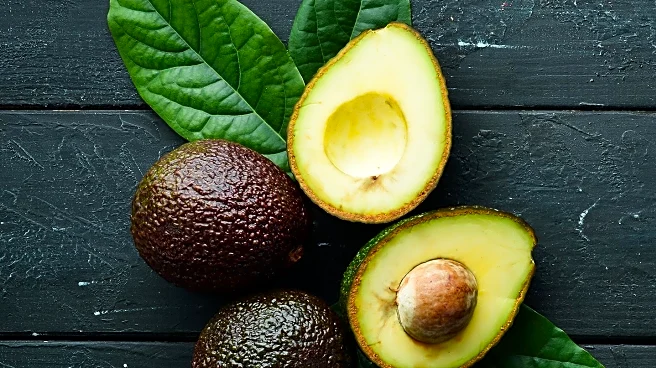What's Happening?
Dietitians are weighing in on the health implications of consuming avocados daily. Avocados, known for their versatility and nutritional benefits, are rich in monounsaturated fats, which are considered heart-healthy. According to Gerri French, a nutritionist in Santa Barbara, California, avocados are a wholesome food with significant nutritional value. They contain essential nutrients such as folate, vitamin B6, vitamin C, and potassium. Research from Harvard's T.H. Chan School of Public Health indicates that consuming avocados can lower the risk of cardiovascular disease and coronary heart disease. However, experts advise moderation, suggesting that while avocados are beneficial, excessive consumption could lead to an imbalance in calorie and fat intake.
Why It's Important?
The discussion around avocado consumption is significant as it highlights the broader conversation about dietary choices and heart health. Avocados are a popular food item in the U.S., often associated with healthy eating trends. The findings that avocados can reduce the risk of heart disease and diabetes underscore their potential role in preventive health strategies. However, the emphasis on moderation is crucial, as it addresses the common misconception that more of a healthy food is always better. This guidance can influence consumer behavior, encouraging balanced dietary habits and potentially impacting public health outcomes.
What's Next?
As the popularity of avocados continues to rise, further research may explore their long-term health benefits and potential risks. Nutritionists and health professionals might develop more detailed guidelines on incorporating avocados into a balanced diet. Additionally, the food industry could respond by creating new avocado-based products that align with health recommendations. Public health campaigns may also leverage these findings to promote heart-healthy eating habits.
Beyond the Headlines
The conversation about avocados also touches on broader themes of sustainable agriculture and food sourcing. As demand for avocados grows, there may be increased scrutiny on the environmental impact of avocado farming, particularly in regions like California and Mexico. This could lead to discussions about sustainable farming practices and the ethical implications of food production.










